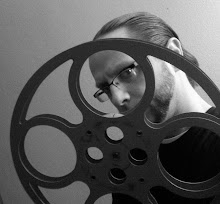FACT: With digital projection becoming more widespread, major studios have decided to get out of the business of renting out their original 35mm film prints to theatres for showing. This has put certain smaller movie theatres in great jeopardy. Houses such as the New Beverly Cinema in L.A., which runs only 35mm film, would eventually have nothing to show.
A passionate online petition is now circulating to try and save what they, and many others consider to be pieces of history. The archival 35mm film prints will be scanned into digital, and then destroyed. Countless cans of decades-old film will hit the incinerators. This is likely the first of many steps major studios will be taking to eventually switch to digital projection in full.
OPINION: For starters, let it be said that this Blogger has a deep love for film projection; having worked as a film (and eventually digital) film projectionist at a major theatre chain for nearly eight years. Reel Speak was born from that deep love; it’s what inspired the name.
However, that love for 35mm film has gradually become more of a nostalgic love than a practical one. This blogger has seen first-hand, both in and out of the booth, how fragile 35mm film can be. Now, a well-maintained projector when running a brand new print right out of the can will look spectacular. However, celluloid eventually will fade from the bulb, and let’s not forget that film projectors have many, many moving parts; all of which can lead to damaged prints, leading to defects on the screen. Defects like annoying black and green scratches, dust, and pictures that jump around and are out of focus are common symptoms. And then there are breakages, which can lead to film snapping in half and the spectacular image of the picture burning and melting on screen. The bottom line is an interrupted movie, which no one likes. Digital projection, while still evolving, avoids any of these defects in the picture and seldom break down. If you are paying good money to see a movie, you certainly deserve to see a perfect, uninterrupted presentation.
Studios know this, and they also know the cost of having to maintain thousands (hell, millions) of film prints over the years. From a practical sense, all of these 35mm film prints cost a lot just to store in a temperature-controlled climate and also take up a lot of space. Some years back, a fire at Universal Studios obliterated countless cans of film. How many original prints of DRACULA (1931) and FRANKENSTIEN (also 1931) were destroyed? No one knows. Digital can solve that problem; by scanning all of these films into data bits, they can be safely stored and preserved forever.
But what about all those 35mm film prints? Should they become ashes? It’s a sad thing to think so. If someone one day discovers a warehouse full of Beatles records on vinyl, should they be destroyed just because they already exist digitally? Hell no. Lots of people would want them, even if they never intend to play them.
This is where the passion of film lovers comes in, and where the studios need to listen. Undoubtedly, there are film collectors out there who would pay top dollar to own an original print of their favorite films. Yes they are space-consuming, but if they want it saved they might have to do it themselves. As for theatres such as the New Beverly, they are just going to have to get with the times. Their passion for 35mm film projection is admirable, but those 50-year old prints they are running have got to look like shit, and they will eventually have to deal with projector companies ceasing support of those old machines. They also must realize their contradiction: they want to preserve the prints so they can play them; but they must know that the more they are played, the more damaged they will be become. Want to preserve your original vinyl copy of LET IT BE? Don’t play it.
We are in an extremely important time in movie history; right smack-dab in the middle of two eras. Film projection has really not changed in a hundred years. That constant is about to end. It is with sad melancholy that this Blogger must side with the practical. By all means let’s save the film, but let’s save them for the right reasons.
What say you? Are movies
meant to be viewed on film? Are we godless heathens for switching to digital? This may be the most important topic in “film” today…
If you are interested in signing the petition to aid in the New Beverly Cinema's effort, here is the link:
http://www.thepetitionsite.com/1/fight-for-35mm/












